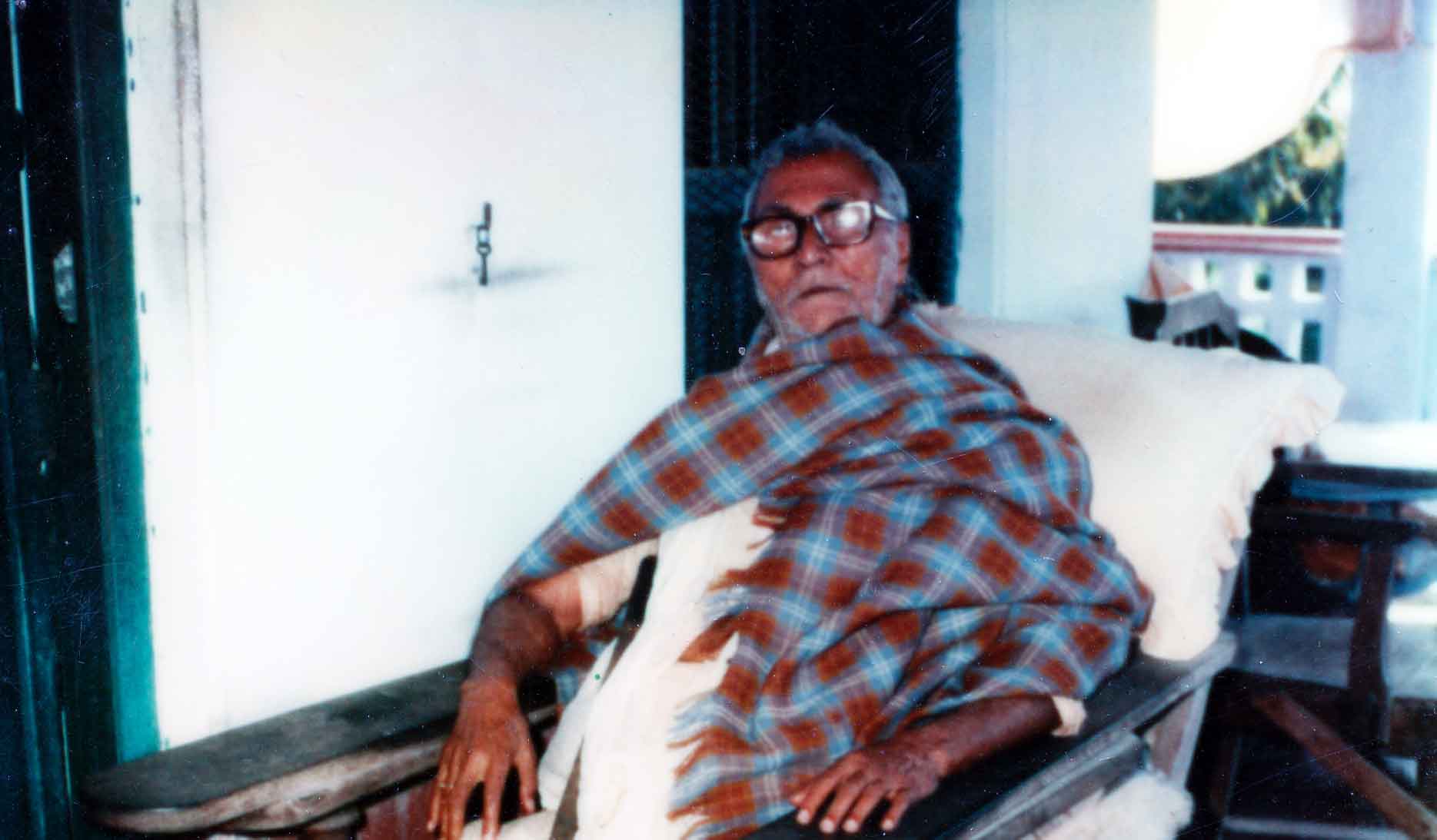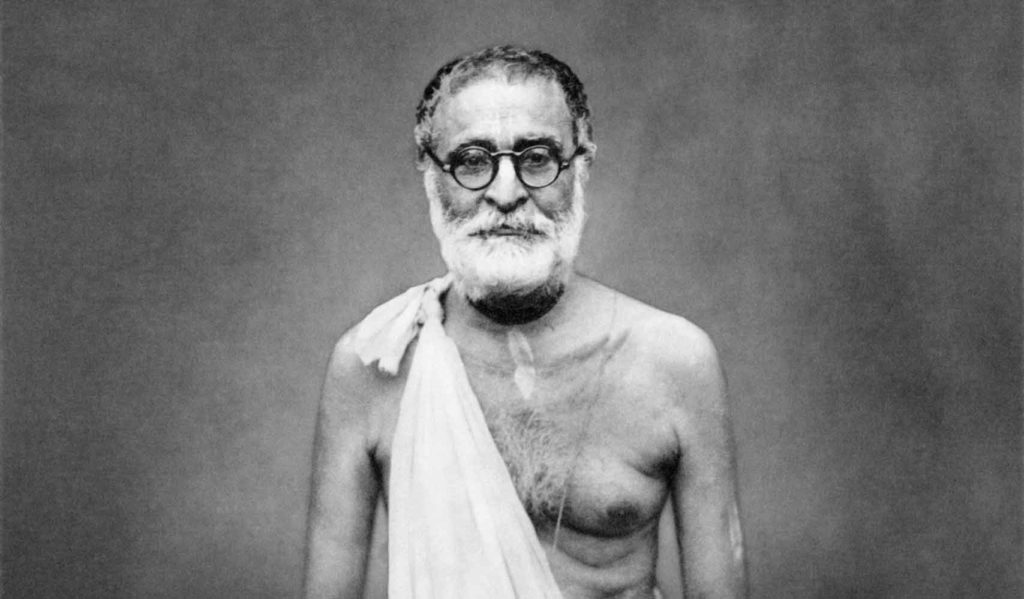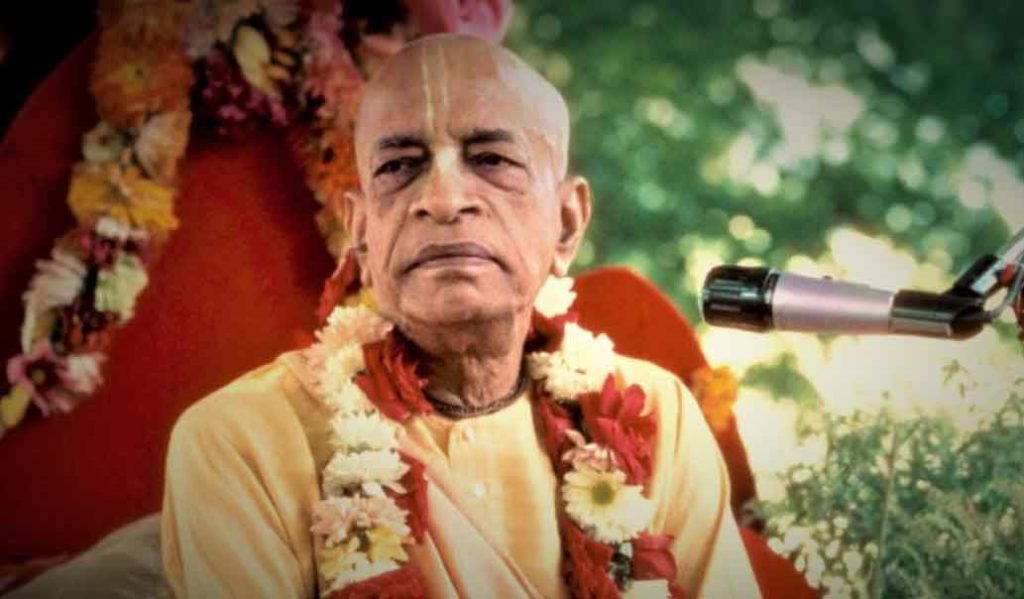Overview
In the essay, "Āgun Jvālbe", Śrīla Śrīdhara Mahārāja writes about how even an imperfect sādhaka must preach about the glories of the Holy Name according to his capacity, and in this way he will accrue the greatest benefit. This article was translated into English by Sanātana Dāsa and Swami B.V. Giri.
Āgun jvalbe – “Light the fire – the wind will come on its own to fan it!”
Far greater than the statement, svayaṁ asiddhaḥ kathaṁ anyan sādhayet (“If you have not achieved perfection yourself, how can you give it to others?”) is the following –
yāre dekha tāre kaha kṛṣṇa-upadeśa
āmāra ājñāya guru hañā tāra ei deśa
“Whoever you see, tell them about the instructions of Kṛṣṇa. In this way become a spiritual master and try to liberate everyone in this land.” (Cc. Madhya-līlā 7.128)
Those who are goṣṭhyānandī-sādhakas are oblivious to how much they may be benefitted or harmed. Śrīman Mahāprabhu has assured them by this instruction. By this instruction they understand what will benefit them and others. Even if you have not become a perfected sādhaka, you should still preach about the Holy Name of Kṛṣṇa. Through this very instruction, Mahāprabhu has given the qualification of preaching to the sādhaka.
During the time of Śrī Yāyāvara Mahārāja’s sannyāsa, Śrīla Prabhupāda (Bhaktisiddhānta Sarasvatī Ṭhākura) bestowed fearlessness upon him by saying, “Are you fearful? Why do you fear? You are going to take shelter of He whose feet bestow fearlessness – yad bibheti svayaṁ bhayam (‘That which fear itself fears’ –Bhāg.1.1.14).”
To offer ourselves in the saṅkīrtana-yajña of Śrīman Mahāprabhu is the only way in which each and every one of us can be protected. That which we are practicing will cure all of our own diseases along with curing the material disease of materialistic persons. “Die to live!” The right to live is our birthright and we need to live with all the dignity a life should have. Only the fire of saṅkīrtana can revive our very essence.
bhasmī-bhavanti-rājendra mahā-pātaka-koṭayaḥ
“The chanting of the Holy Name destroys millions of great sins.” (Viṣṇu-dharma Purāṇa)
If you perform real kṛṣṇa-kīrtana then you will have nothing to fear. The true necessity is the fire of spirituality. In order to benefit ones self and other living entities – āmāra ājñāya guru hañā tāra ei deśa(“accept my instruction and become a spiritual master to try to liberate everyone in this land”). Those that will listen to you will fan the fire of your saṅkīrtana.
Once, Śrīpāda Bhakti Hṛdaya Vana Mahārāja occidentally entered a prostitute’s house when he went out for bhikṣā. After Prabhupāda heard about this, he referred to the incident when he was speaking hari-kathā – “Did I make a mistake in this regard? These are boys who left material things, just as one rejects one’s own stool; they left their homes to join me – and again I am sending them to the doors of materialists. Why am I sending them? I have not committed any mistake!”
In this respect he told the story of two sādhus in Haridwar. The two sādhus saw a black blanket floating in the waters of the Gaṅgā. Seeing this, when one of them went to take the blanket out of the water, he was immediately embraced by it. The blanket was actually a bear. When the bear was floating in water, he was thinking that the sādhu was his protector and embraced him. The other sādhu saw that he was not coming out of the water with the blanket. Then he said, “Arey bhāi! Just leave the blanket and come out!” The one in the water replied, “Bhāi, I am leaving the blanket – but the blanket is not leaving me!”
Similarly, even if you want to stay far away from the material world, the material world will not leave you. You have been intimate with it for such a long time – why will it leave you today when you want to dissociate yourself from it? For millions of births you have been entangled in it. It has entered every part of your existence and has dethroned your very self. Therefore, simply asking it to leave will not make it leave. This is a blatant truth. Thus, to remove it you will also have to take a very effective and real course of action.
indriyāṇi mano buddhir asyādhiṣṭhānam ucyate
“The senses, the mind and the intelligence are considered to be the residence of lust.” (Gītā 3.40)
Your mind, your intelligence, your senses etc. – all these bases have been occupied by it. Hence it is natural that it will be more powerful. Still, your very endeavour should be to regain control of these lost bases. The science of your relationship with Kṛṣṇa – that is your only brahmāstra.
tāvad-bhayasya bhetavyaṁ yāvad-bhayam-anāgatam
agataṁ tu bhayaṁ vīkṣya pratikuryāt yathocitam
“One should be apprehensive of the cause of fear when it is far away. But upon seeing the cause of fear getting closer, one should fight it without a doubt.” (Cāṇakya-nīti 236)
When you have declared a revolution, you should also be ready for retaliation. You have to work hard. There is evidence of this in the kāmādīnāṁ śloka –
kāmādīnāṁ kati na katidhā pālitā durnideśās
teṣāṁ jātā mayi na karuṇā na trapā nopaśāntiḥ
utsṛjyaitān atha yadu-pate sāmprataṁ labdha-buddhis
tvām āyātaḥ śaraṇam abhayaṁ māṁ niyuṅkṣvātma-dāsye
“O my Lord, there is no limit to the unwanted orders of lusty desires. Although I have rendered these desires so much service, they have not shown any mercy to me. I have not been ashamed to serve them, nor have I even desired to give them up. O my Lord, O head of the Yadu Dynasty, recently, however, my intelligence has been awakened, and now I am giving them up. Due to transcendental intelligence, I now refuse to obey the unwanted orders of these desires, and I now come to You to surrender myself at Your fearless lotus feet. Kindly engage me in Your personal service and save me.” (Bhakti-rasāmṛta-sindhu 3.2.35)
Therefore simply pushing back material objects will not make it leave. Yukta-vairāgya is the only effective way of renouncing material objects. You have no other way but to adopt nirbandhaḥ kṛṣṇa sambandhe (using everything in relation to Kṛṣṇa). In Prabhupada’s logo in The Gauḍīya there are two Bengali stanzas in his own handwriting –
śrī hari-sevā yāḥā anukūla
viṣaya baliyā tyāge haya bhūla
āsakti rahita sambandha sahita
viṣaya samuha sakali mādhava
“It is a mistake to renounce whatever is favourable to the service of Śrī Hari, thinking it to be a material object. Without attachment, in its proper relation, all matter should be viewed as belonging to Mādhava.”
This is Prabhupāda’s formula. Create your own neighbours and relationships. Yāre dekha tāre kaha kṛṣṇa-upadeśa (“Whoever you see, tell them about the instructions of Kṛṣṇa”). Kabhu nā bādhibe tomāra viṣaya-taraṅga (“The waves of materialism will not obstruct you at any time” – Cc. Madhya-līlā 7.129). Be desperate for it! Totalitarian war! Whatever your position is, remember that it is the only way to survive. Śrī Mahāprabhu has said, “Do not think that after making you come forward, I will not make any endeavour Myself. Punarapi ei ṭhāñi pābe mora saṅga (“Again you will attain shelter in My association” – Cc. Madhya-līlā 7.129). You are a soldier. I am carrying all of your responsibility upon Me. In this very work you will find Me.”
Related Articles & Books
- Vaiṣṇava Nindā by Śrīla Bhaktivinoda Ṭhākura
- A Devotee is Merciful (Sajjana – Kṛpālu) by Śrīla Bhaktisiddhānta Sarasvatī Ṭhākura
- A Devotee Does Not Engage in Violence (Sajjana – Akṛta-droha) by Śrīla Bhaktisiddhānta Sarasvatī Ṭhākura
- A Devotee is the Epitome of Truth (Sajjana – Satya-sāra) by Śrīla Bhaktisiddhānta Sarasvatī Thākura
- Śiva-tattva & the Position of Lord Śiva by Śrīla B.R. Śrīdhara Mahārāja
- Oh Bābā! Bolacche-re! by Śrīla B.R. Śrīdhara Mahārāja
- Problems and Solutions by Śrīla B.R. Śrīdhara Mahārāja
- The Highest Attainment and Present Adjustment by Śrīla B.R. Śrīdhara Mahārāja
- Āgun Jvālbe (Light the Fire!) by Śrīla B.R. Śrīdhara Mahārāja
- Dharma and the Modern World by Śrīla A.C. Bhaktivedānta Swami Prabhupāda
- Faith Confirms the Absolute by Śrīla B.G. Narasiṅgha Mahārāja
- Go Deeper! by Śrīla B.G. Narasiṅgha Mahārāja
- To Be a Servant by Śrīla B.G. Narasiṅgha Mahārāja
- Harmony – Real and Apparent by Swami B.V. Giri
- The Definition of Faith by Gaura Gopāla Dāsa
- Ātma Samīkṣā – The Value of Introspection by Kalki Dāsa
- Frogs in the Well of Prejudice by Kalki Dāsa
Further Reading
- Śraddhā (Faith) – Quotes by Bhaktivinoda Thakura
- Śraddhā and Śaraṇāgati by Śrīla Bhaktivinoda Ṭhākura
- The Association of Sādhus by Śrīla Bhaktivinoda Ṭhākura
- Epilogue to Śrī Kṛṣṇa Karṇāmṛta by Śrīla Bhaktivinoda Ṭhākura
- Prīti (Love) by Śrīla Bhaktivinoda Ṭhākura
- A Dispute Concerning Mahāprasāda by Śrīla Bhaktivinoda Ṭhākura
- Śraddhā by Śrīla Bhaktivinoda Ṭhākura
- Materialistic Association by Śrīla Bhaktivinoda Ṭhākura
- Dispelling Doubts by Śrīla Bhaktivinoda Ṭhākura
- The Enemy by Śrīla Bhaktivinoda Ṭhākura
- A Critique of the book ‘Vanamālā’ by Śrīla Bhaktivinoda Ṭhākura
- Kali by Śrīla Bhaktivinoda Ṭhākura
- Offences Against Bhakti by Śrīla Bhaktivinoda Ṭhākura
- Kārttika-vrata by Śrīla Bhaktivinoda Ṭhākura
- Violence and Mercy by Śrīla Bhaktivinoda Ṭhākura
- Abandoning Bad Association by Śrīla Bhaktivinoda Ṭhākura
- Sad-guṇa and Bhakti by Śrīla Bhaktivinoda Ṭhākura
- The Process of Initiation by Śrīla Bhaktivinoda Ṭhākura
- Dainya (Humility) by Śrīla Bhaktivinoda Ṭhākura
- Vaiṣṇava Nindā (Offences to Devotees) by Śrīla Bhaktivinoda Ṭhākura
Pilgrimage with Swami Narasiṅgha – Part 7: Keśī Ghāṭa
Continuing with our pilgrimage series, this week Śrīla Narasiṅgha Mahārāja takes us to Keśī Ghāṭā where he tells us about Madhumaṅgala’s meeting with the Keśī demon, what Keśī represents, and how Śrīla Prabhupāda almost acquired Keśī Ghāṭa. Mahārāja also narrates his own experience. This article has been adapted from a number of talks and articles by Narasiṅgha Mahārāja.
Prema Dhāma Deva Stotram with the Narasiṅgha Sevaka Commentary – Verses 61-65
In verses 61 to 65 of 'Prema Dhāma Deva Stotram', Śrīla Śrīdhara Mahārāja narrates the pastime of Śrī Caitanya at Caṭaka Parvata In Purī and explains how the scriptures produced by Brahmā and Śiva are ultimately searching for the personality of Mahāprabhu who is merciful too all jīvas, no matter what their social position.
Prabhupāda Śrīla Sarasvatī Ṭhākura’s Visit to Ayodhyā
With the forthcoming observance of Śrī Rāma Navamī, we present 'Prabhupāda Śrīla Sarasvatī Ṭhākura’s Visit to Ayodhyā' written by Śrīla Bhaktisiddhānta Sarasvatī Ṭhākura Prabhupāda from The Gaudīyā magazine, Vol 3. Issue 21/ In December 1924, after visiting Benares and Prāyāga, Sarasvatī Ṭhākura visited the birth-site of Śrī Rāmācandra in Ayodhyā.
Śaraṇāgati – The Only Path to Auspiciousness
In this article, 'Śaraṇāgati - The Only Path to Auspiciousness', Dhīra Lalitā Dāsī analyses the process of śaraṇāgati (surrender) beginning with śraddhā (faith). She also discusses the role of śāstra and the Vaiṣṇava in connection with surrender.
Pilgrimage with Swami Narasiṅgha – Part 7: Keśī Ghāṭa
Continuing with our pilgrimage series, this week Śrīla Narasiṅgha Mahārāja takes us to Keśī Ghāṭā where he tells us about Madhumaṅgala’s meeting with the Keśī demon, what Keśī represents, and how Śrīla Prabhupāda almost acquired Keśī Ghāṭa. Mahārāja also narrates his own experience. This article has been adapted from a number of talks and articles by Narasiṅgha Mahārāja.
Prema Dhāma Deva Stotram with the Narasiṅgha Sevaka Commentary – Verses 61-65
In verses 61 to 65 of 'Prema Dhāma Deva Stotram', Śrīla Śrīdhara Mahārāja narrates the pastime of Śrī Caitanya at Caṭaka Parvata In Purī and explains how the scriptures produced by Brahmā and Śiva are ultimately searching for the personality of Mahāprabhu who is merciful too all jīvas, no matter what their social position.
Prabhupāda Śrīla Sarasvatī Ṭhākura’s Visit to Ayodhyā
With the forthcoming observance of Śrī Rāma Navamī, we present 'Prabhupāda Śrīla Sarasvatī Ṭhākura’s Visit to Ayodhyā' written by Śrīla Bhaktisiddhānta Sarasvatī Ṭhākura Prabhupāda from The Gaudīyā magazine, Vol 3. Issue 21/ In December 1924, after visiting Benares and Prāyāga, Sarasvatī Ṭhākura visited the birth-site of Śrī Rāmācandra in Ayodhyā.
Śaraṇāgati – The Only Path to Auspiciousness
In this article, 'Śaraṇāgati - The Only Path to Auspiciousness', Dhīra Lalitā Dāsī analyses the process of śaraṇāgati (surrender) beginning with śraddhā (faith). She also discusses the role of śāstra and the Vaiṣṇava in connection with surrender.








